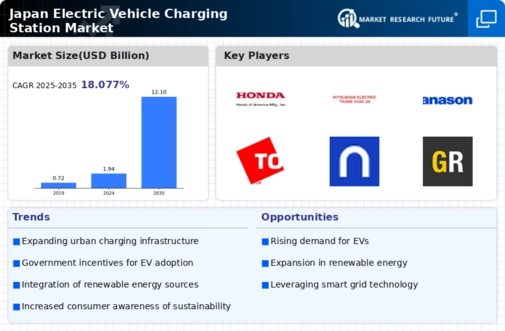Rising Electric Vehicle Adoption
The increasing adoption of electric vehicles (EVs) in Japan is a primary driver for the electric vehicle-charging-station market. As of 2025, the number of registered EVs has surged, with estimates indicating a growth rate of approximately 30% annually. This trend is largely fueled by consumer awareness of environmental issues and the desire for sustainable transportation options. The Japanese government has set ambitious targets for EV adoption, aiming for 1 million EVs on the road by 2030. Consequently, the demand for charging infrastructure is expected to rise significantly, necessitating the expansion of the electric vehicle-charging-station market to accommodate this influx of vehicles. The interplay between consumer preferences and government initiatives is likely to shape the future landscape of the market, driving investments in charging stations across urban and rural areas.
Government Regulations and Standards
Government regulations and standards play a pivotal role in shaping the electric vehicle-charging-station market. In Japan, stringent regulations aimed at reducing carbon emissions are driving the transition to electric mobility. The government has implemented various standards for charging station installations, ensuring safety and interoperability among different EV models. These regulations are designed to create a cohesive charging network that can support the growing number of electric vehicles. Additionally, the establishment of incentives for businesses to install charging stations is further propelling market growth. As compliance with these regulations becomes mandatory, the electric vehicle-charging-station market is likely to see an increase in the number of installations, thereby enhancing the overall infrastructure and accessibility for EV users.
Investment in Charging Infrastructure
Investment in charging infrastructure is a crucial factor influencing the electric vehicle-charging-station market. In Japan, both public and private sectors are channeling substantial funds into the development of charging networks. Reports suggest that investments in charging infrastructure could reach ¥1 trillion by 2030, reflecting a commitment to enhancing the accessibility and convenience of EV charging. This financial backing is essential for establishing a robust network of fast and standard charging stations, which is vital for alleviating range anxiety among potential EV users. Furthermore, the collaboration between local governments and private enterprises is fostering innovative solutions to expand charging capabilities, thereby stimulating market growth. The ongoing investment trends indicate a proactive approach to meeting the anticipated demand for charging stations as EV adoption continues to rise.
Consumer Demand for Sustainable Solutions
Consumer demand for sustainable solutions is a significant driver of the electric vehicle-charging-station market. As awareness of climate change and environmental issues grows, Japanese consumers are increasingly seeking eco-friendly transportation options. This shift in consumer behavior is reflected in the rising interest in electric vehicles, which are perceived as a cleaner alternative to traditional gasoline-powered cars. The demand for convenient and accessible charging stations is therefore escalating, as consumers look for solutions that align with their values. Market data indicates that approximately 70% of potential EV buyers consider the availability of charging infrastructure as a critical factor in their purchasing decisions. This consumer-driven demand is likely to encourage further investment in the electric vehicle-charging-station market, fostering a more extensive network of charging options across the country.
Technological Innovations in Charging Solutions
Technological innovations in charging solutions are significantly impacting the electric vehicle-charging-station market. The introduction of ultra-fast charging technology, which can recharge an EV in under 30 minutes, is transforming consumer perceptions and usage patterns. In Japan, advancements in battery technology and smart charging systems are enhancing the efficiency and reliability of charging stations. The integration of renewable energy sources, such as solar power, into charging infrastructure is also gaining traction, aligning with Japan's sustainability goals. As these technologies evolve, they are likely to attract more users to electric vehicles, thereby increasing the demand for charging stations. The electric vehicle-charging-station market is poised to benefit from these innovations, as they not only improve user experience but also contribute to the overall growth of the EV ecosystem.
















